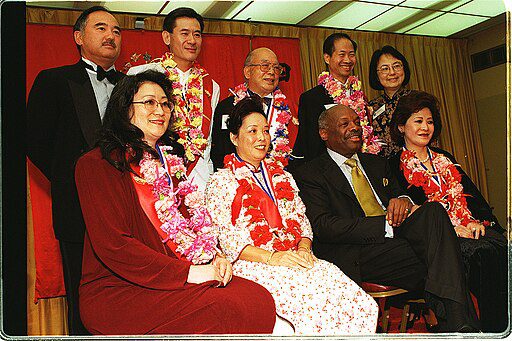
Back in 2020, I met a local politician who asked for my advice about how she could better serve the Asian Americans in her district. During our conversation, this politician mentioned a large Korean American church perched prominently on a hill on a main thoroughfare in the city. Who are the people in this church? she asked. Do they even care about the election? In her view, these Korean American Christians were a cloistered community completely disengaged from American politics.
Later that fall, I spent some time volunteering with a nonpartisan get-out-the-vote effort targeting Asian Americans, and I found myself doing what this local politician should have been doing all along: talking directly with some of these Korean American church members. What these Korean American Christians said would have surprised her. In both Korean and English, they said that, yes, of course they were planning to vote. (They seemed offended that I had even asked.) They were paying close attention to the statements and actions of Donald Trump and Joe Biden. And they were deeply concerned about how the election would affect their community, which was facing a surge in anti-Asian racism and violence sparked by the Covid-19 pandemic.
It’s a presidential election year again. Our country is polarized, and the polls indicate that national, state, and local races will once again be close. Asian American voters—including Asian American religious voters—can play a decisive role in elections where the margin of victory will be slim. However, Asian American voters continue to be a mystery to many politicians and community members. So, for today’s post, I’m sharing three basic things Americans need to know about Asian Americans, religion, and the 2024 election.
1. Asian American voters matter and can play a decisive role in elections at the national, state, and local levels.
According to Pew, Asian Americans have been the most rapidly growing group of eligible voters in the United States for over two decades. While most Asian Americans reside on the coasts and in Hawaii, all regions of the country have witnessed the expansion of the eligible Asian American voting population. For example, in Indiana, where I live, APIA Vote reports that the number of eligible Asian American voters grew 58 percent between 2012 and 2022.
Some of the states that have seen the most growth in the Asian American population are swing states, where races will be tight and where Asian American voters can play a decisive role. For example, APIA Vote found that the Asian American Pacific Islander (AAPI) population in Nevada has increased 167 percent since 2000. The AAPI population in Arizona has grown by 157 percent during the same period and North Carolina, by 154 percent.
At the local level, Asian American voters are often located in swing districts, where they can shape the outcome of key races. For example, Hamilton County, which encompasses the northern suburbs of Indianapolis, has long been a Republican stronghold that has trended purple in recent years. Asian Americans are now 9.3 percent of the eligible voting population in Hamilton County—a group large enough to have an impact on who wins the two open statehouse seats in that county this year.
2. Asian American voters are religious voters, but a very diverse group of religious voters.
Asian Americans include people who come from a wide array of religious backgrounds. A recent Pew survey found that 34 percent of Asian Americans are Christian, and an almost equal percent (32 percent) of adult Asian Americans are religiously unaffiliated. Beyond those two groups, the remaining Asian American religious population is Buddhist (11 percent), Hindu (11 percent), Muslim (6 percent), and other (4 percent).
On one hand, Asian Americans include a large number of very religiously devout people who attend worship services regularly and who consider religion to be very important to their lives. On the other hand, Asian Americans are distinctive for having the highest proportion of religiously unaffiliated people, and according to the Public Religion Research Initiative, they are the group that is most likely to view Christian nationalism skeptically (42 percent) or reject it outright (43 percent).
3. Asian American religious voters challenge the standard story of religion and political affiliation.
Due to a number of factors, including their religious identities and their racial position, Asian Americans have complex political beliefs and behaviors that sometimes upend common assumptions about the relationship between religion and politics. For example, journalists and academics alike write frequently about how Christian voters support the Republican Party. While this is true for white voters, the situation is more complicated for Asian American Christian voters.
First, Asian American Catholics and non-evangelical Protestants buck that trend outright. According to Pew, 37 percent of white Catholics identify as Democrats or lean Democratic, while 61 percent identify as Republican or lean Republican. But among Asian American Catholics, the opposite is true: 60 percent identify as Democrats or lean Democratic, while 35 percent are Republican or lean Republican. A similar pattern holds for non-evangelical Protestants. As Pew reports, among white non-evangelical Protestants, 39 percent are Democratic or lean Democratic, while 58 percent are Republican or lean Republican. But among Asian American non-evangelical Protestants, the majority identify as Democrats or lean Democratic: 53 percent identify as Democrats or lean Democratic, while 42 percent are Rep or lean Rep.
Asian American evangelicals are the only group in which the majority affiliates with the Republican Party. However, Asian American evangelicals support the Republican Party at far lower levels than their white counterparts do. As Pew reports, among white evangelicals, 14 percent are Democratic or lean Democratic, while 85 percent are Republican or lean Republican. By contrast, Pew found that far more—39 percent, to be exact—Asian American Evangelical Protestants are Democrats or Democratic leaners. Only 56 percent of Asian American evangelicals are Republican or lean Republican—barely a majority.
Even more interesting is how Asian American Christian voters are talking about key issues. Asian American evangelicals often take positions that are more liberal than those of white evangelicals. For example, the Washington Post reported last year that Walter Kim, the Korean American leader of the National Association of Evangelicals, has spoken openly about the need for racial justice and immigration reform and that Tom Lin, the Taiwanese American leader of the campus Christian group Intervarsity, has supported the Black Lives Matter movement. In the wake of the 2022 shooting at the Taiwanese Presbyterian Church in Laguna Woods, California, Asian American evangelicals have been advocating for gun control. Finally, Asian American evangelicals have supported policies to combat climate change and support health care reform. As the political scientist Janelle Wong explained,
…[W]hile Asian American evangelicals tend to exhibit more religiosity in terms of church attendance and fundamentalist ideas about Christianity than white evangelicals, they are much less conservative than white evangelicals on issues ranging from climate change to health care reform. Less than 10 percent of Asian American evangelicals oppose the government doing more to combat climate change, versus nearly 30 percent of white evangelicals. White evangelicals oppose the federal government guaranteeing health care at nearly twice the rate of Asian American evangelicals.
Ultimately, Asian Americans not only challenge the black-white racial binary but also the liberal-conservative/Democratic-Republican political binary that scholars of religion and politics often take for granted.
Yesterday I participated in a voting rights event in another city in Indiana, and I had the opportunity to speak with a different politician who also represents a district with a sizable Asian American population. This politician, like the elected official with whom I met in 2020, knew very little about Asian Americans. What she did know—“All Asian Americans are Christian conservatives,” she said—was also quite misinformed. I tried to tell her more about what the research says about Asian American religious voters, and then I asked her directly: “Have you even talked to Asian American religious voters in your district?” In fact, she hadn’t.
The situation reveals a concerning fact: Asian American voters are often ignored, by everybody from reporters and researchers to politicians. According to APIA Vote, a majority of Asian American voters haven’t received any outreach from either political party. Community organizations doing nonpartisan voter engagement work don’t do a great job of connecting with Asian American voters, either.
Given the significance of this group, ignoring Asian American voters is poor political strategy. In the short run, it can sink a campaign. In the long run, it can mean losing the chance to find key allies to support shared policy goals.
Most importantly, ignoring Asian American voters is a failure of values. If we want to create a healthy democracy and a just society that welcomes and honors the inherent worth and dignity of all people, then we need to cultivate relationships with all our neighbors. Those neighbors include Asian Americans.













